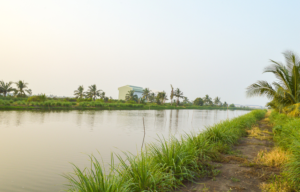1. What is fish farming?
- Fish farming, also known as aquaculture, is the practice of cultivating fish in controlled environments like ponds, tanks, or enclosures. It involves the breeding, rearing, and harvesting of fish for various purposes, including food production.
2. Why is fish farming important?
- Fish farming plays a crucial role in meeting the increasing global demand for seafood. It helps conserve wild fish populations, provides employment, and contributes to food security.
3. What types of fish are commonly farmed?
- Commonly farmed fish include tilapia, catfish, salmon, trout, carp, shrimp, and various species of shellfish.
4. How is fish farming different from traditional fishing?
- Fish farming involves controlled environments and artificial reproduction, while traditional fishing relies on catching wild fish in their natural habitats.
5. What are the key components of a fish farm?
- A typical fish farm includes ponds or tanks, aeration systems, water quality management tools, fish feed, and facilities for harvesting and processing.
6. How is water quality maintained in fish farms?
- Water quality is maintained through proper filtration, aeration systems, regular monitoring of parameters like temperature and oxygen levels, and the use of natural or chemical additives when necessary.
7. What is the role of fish feed in aquaculture?
- Fish feed provides essential nutrients for the growth and development of farmed fish. It usually consists of a combination of proteins, carbohydrates, fats, vitamins, and minerals.
8. Are antibiotics and chemicals used in fish farming?
- While antibiotics and chemicals may be used in some fish farms to prevent diseases, there is a growing emphasis on sustainable and responsible aquaculture practices to minimize their use.
9. How is disease management handled in fish farming?
- Disease management involves regular health checks, quarantine procedures, vaccination when applicable, and maintaining optimal water quality to prevent the spread of diseases.
10. Is fish farming environmentally sustainable? – Sustainable practices, such as proper waste management, reduced reliance on wild fish for feed, and habitat conservation, can make fish farming environmentally friendly. However, improper practices can lead to negative environmental impacts.
11. Can fish farming be done at home? – Yes, small-scale fish farming can be done at home using backyard ponds or indoor tanks. However, it requires proper knowledge, equipment, and commitment to maintaining water quality and fish health.
12. How can I start a fish farming business? – Starting a fish farming business involves research, planning, obtaining necessary permits, setting up infrastructure, sourcing quality fish, and implementing sustainable practices. Seeking guidance from experts or local agriculture departments is recommended.
Always consult with local authorities and aquaculture experts for specific guidelines and regulations in your region before starting a fish farming venture.


